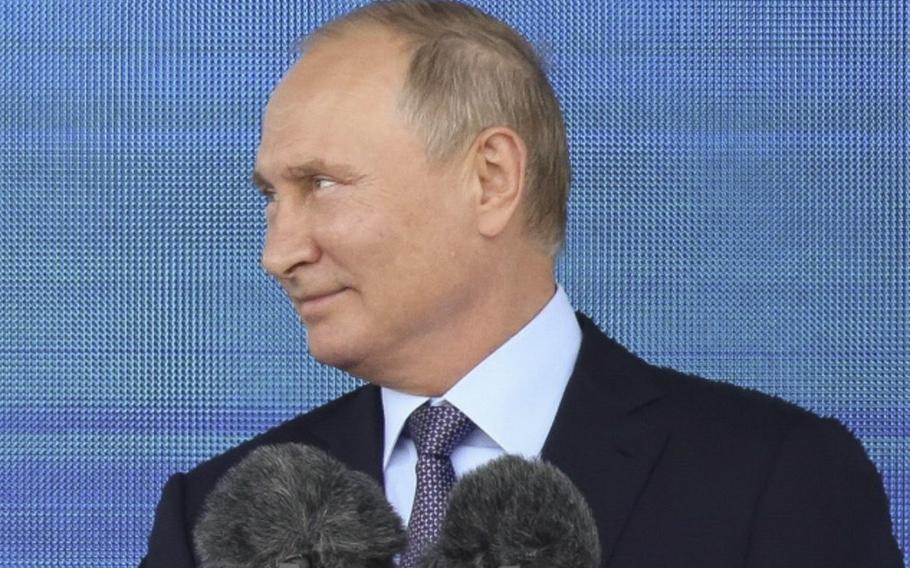
Russia’s President Vladimir Putin attends a briefing in Moscow on Aug. 27, 2019. (Andrey Rudakov/Bloomberg)
WASHINGTON - Russian President Vladimir Putin is "playing chess" with the West by moving military forces and equipment along Russia's border with Ukraine, Ukraine's new defense minister said Friday while calling on the United States and European nations to hold the Kremlin accountable for any renewed aggression.
"He is testing the unity of the European Union, he is testing the unity of NATO allies, he is testing our society, Ukrainians, he is testing Poland, the Baltic countries," Defense Minister Oleksiy Reznikov said in an interview during his visit to Washington, a trip that has included face-to-face talks with Defense Secretary Lloyd Austin and a request for additional military assistance.
Reznikov said he and his American counterpart came to the same conclusions about the situation on the Russia-Ukraine border, though he suggested some Ukrainian officials initially viewed the developments with less alarm, having grown numb to the threat from Russia after nearly eight years of war.
"We have the same assessment of the risks, of the threats, but the difference is in risk perception," Reznikov said. "We are living in this standard of life for eight years, so we have like psychological immunity."
Reznikov declined to go into detail about the request he made to the Pentagon.
Austin said ahead of Thursday's meeting with Reznikov that the U.S. military was continuing to monitor the situation on the border between Russia and Ukraine and acknowledged Washington was unclear on the meaning of the latest moves.
"We are not sure exactly what Mr. Putin is up to, but these movements certainly have our attention," Austin said, calling on Russia to be transparent about its military activities near the border.
Speaking to The Washington Post, Reznikov said he believed Putin was at an inflection point, deciding whether to "go through the Ukrainian border and burn the bridges, or he is still bargaining and trying to find something interesting for him."
"I hope he has not made his decision on this point," Reznikov said, accusing Putin of "trying to grow that fear in the hearts of people."
U.S. officials have raised alarms with their European colleagues in recent days about Russian military movements near the Ukrainian border and the possibility that Russia could mount an invasion.
Putin has also escalated his rhetoric on Ukraine and warned that NATO countries are crossing Russia's red lines with their actions in conjunction with Ukrainian forces near Russia's borders.
Michael Kofman, a Russia expert and military analyst at Virginia-based CNA, has said the Russian military movements could be preparation for action sometime early next year. He cautioned against believing the Russian military wouldn't launch an offensive in the middle of the winter.
The last time Russian-backed forces in east Ukraine took significant territory, changing the front lines of the conflict and capturing the city of Debaltseve, the offensive began in mid-January.
The Biden administration dispatched CIA Director William Burns to Moscow earlier this month in part to warn the Russian government against pursuing any such renewed offensive, according to a U.S. official familiar with the visit. The U.S. government has also been sharing its intelligence with the Ukrainians and European allies to build a shared picture of the situation, according to U.S. and Ukrainian officials.
The information sharing is a prelude to talks about what the United States, Canada and their European allies can do to warn the Kremlin against such an offensive and better prepare Ukraine for the possibility. Those actions could include issuing sanctions or providing more equipment to the Ukrainian military, one U.S. official said.
Reznikov said U.S., European and Ukrainian officials must dissuade Putin from conducting a new offensive because any such invasion could be far more costly for Ukraine and Europe than Russia's actions in 2014.
"We need to stop him before, not after," Reznikov said. "It will not be a Crimea case . . . it will be a bloody massacre."
Reznikov's visit to the United States, his first as Ukraine's newly minted defense minister, came as Putin gave an address to the Russian Foreign Ministry in Moscow outlining his view of global affairs. Putin had harsh words for the government of Ukrainian President Volodymyr Zelensky, which he accused of leading to a "dead end" the Minsk accords designed to resolve the conflict in Ukraine's east.
Putin also lashed out at exercises that the United States and its NATO allies have been conducting, often in conjunction with Ukraine, in the Black Sea region. The Washington Post reported Friday that the White House has asked the Pentagon to provide a rundown of U.S. military activities and exercises in Europe and provide their policy justification, as Russia repeatedly raises concerns about the drills.
This week, Russia's Foreign Ministry shocked diplomats by releasing traditionally confidential correspondence with France and Germany over a new round of peace talks involving France, Germany, Russia and Ukraine to discuss ending the conflict.
Russia's release of the correspondence came after France accused Russia of refusing to commit to a new round of talks on the ministerial level.
Russian Foreign Minister Sergei Lavrov said such comments were "arrogant" and "not exactly appropriate or ethical," and released the correspondence in an attempt to dispute the claim.
Reznikov described his surprise at the Russian Foreign Ministry's release of the letters and said it was perhaps the product of "something emotional" on the part of Lavrov.
Asked during a news conference whether his French and German counterparts had rattled him, Lavrov said, "We are all human. You could say they got to me."
Reznikov declined to comment Friday on what specific piece of territory Russia may be eyeing, saying he didn't want to give Moscow any ideas.
"Our intelligence, American intelligence and U.K. intelligence - we have the same perception," Reznikov said. "So we know about that, and we agree."